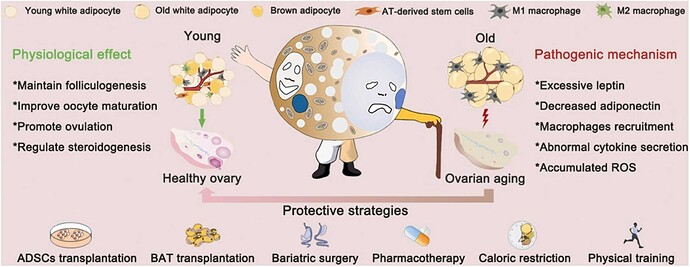Appreciate the link. Reviewing now.
Peter Attia has a very positive opinion on how rapamycin seems likely to help women reduce age-related fertility and ovarian functional decline. See this video below, queued up at the point where he discusses it:
Very nice to hear that positive opinion from Peter Attia specifically on rapamycin’s potential for extending women’s fertility and ovarian health. Thanks for sharing. I think this is really a huge issue. That women are coached to be successful professionally and focus on careers and meanwhile the ovaries are aging at 2.5x the rate of the rest of the body and that doesn’t leave much time for fertility and having children. And of course in general the fact that menopause brings with it the onset of much greater health risks/issues for women. I don’t know if men consider what their lives would be like if they stopped being able to produce sperm well by around 40 and then completely by/around age 50. The relatively short window of adult female fertility is such a huge factor in the life planning of a woman. It is nice to see this issue getting the beginnings of attention and also that rapamycin is showing some potential to help.
The problem would have been solved a long time ago if this were the case… sadly, research is dominated by men right now. The tide seems to be changing.
I also am low in weight (~40-41kg) and experience significant side effects on a dose of 6mg per week. Even though I slowly increased my dose to get there. I experience a quite annoying rash on the two outer fingers of my right hand, each time after dosing. This rash will disappear after a week - so I started to space out my doses further apart. It looks like eczema and is itchy and scaly. I’ve had some mouth ulcers, and usually a significant headache for half a day, on day 2 or 3 after dosing. No changes in my menses the past months. These side-effects came up when I reached a dose of 5mg per week and have been persistent.
Hi @Pat25 , given your low weight, perhaps a lower dose is better?
How long have you been taking rapamycin and have you seen any benefits?
Thanks Rapadmin, yes you may be right that I should lower my dose.
But admittedly I tend to believe Blagosklonny may be spot on when he claimed higher doses may yield better results. I thought he also mentioned that a higher dose of Rapa may be able to cross the blood brain barrier? Looking through some rodent studies I’m just not convinced that the low doses we are taking may have any effects on lifespan. So I’m frankly considering increasing my dose, but only dosing every 3-4 weeks - and just riding out the side-effects.
I’ve been taking Rapa for almost half a year. My blood work is due soon, so that may give me a bit more insight in where I’m standing. Albeit my values (CRP, lipids, liver/kidney function and Hba1c) were great prior to starting Rapa, so I’m not keeping my hopes up too high.
@Pat25 , I’d be very interested to hear about your results going forward.
There doesn’t appear to be that many women taking Rapa, so I’m always interested in other women’s perspectives.
I’m 20 kilos heavier than you (and female) and am only taking 3mg a week. I’ll continue this for 3 months then get my bloods checked.
If all is okay I’ll start titrating upwards.
I’m happy to deal with skin rashes/canker sores, but if my lipids or blood sugar take a hit, I don’t think I’ll be as ambitious.
This is also my concern, not in the least since my lipids looked very good prior to starting Rapa. Sometimes apparently lipids can increase temporarily after starting Rapamycin, so I hope at 6 months I will be able to get a rough impression of the potential effects of Rapamycin on my lipid values.
Yes that sounds like a good plan.
I’m trying to curb my impatience to want to rush into the higher dosage vs. taking it slow and steady.
Keep us posted!
I definitely recognise what you are writing - I also felt impatience when I was slowly titrating up to a higher dose. But in terms of side-effects ‘slow’ does seem to be the way to go. Thanks, Basil_Dev, would love to hear how you are doing on Rapa the upcoming period also.
This new review article on ovarian aging suggests that higher adipose tissue (body fat) the faster the ovarian aging, so the best way to maintain fertility at a baseline is to minimize excess adipose tissue:
Recently, studies have revealed an association between adipose tissue (AT) and ovarian aging. Alterations in the function and quantity of AT have profound consequences on ovarian functionbecause AT is central for follicular development, lipid metabolism, and hormonal regulation. Moreover, the interplay between AT and the ovary is bidirectional, with ovary-derived signals directly affecting AT biology. In this review, we summarize the current knowledge of the complex molecular mechanisms controlling the crosstalk between the AT and ovarian aging, and further discuss how therapeutic targeting of the AT can delay ovarian aging.
I’m 46 years old, 5’9.5", 120 lbs and have been taking 6 mg/week Rapa for three years. I got some mouth sores in the beginning but now I only get a sore about once every four months. I am a physician and am very excited about the idea that Rapa may delay ovarian aging (and, thus, keep us making valuable hormones for longer). There’s also research (in animals) that shows Metformin, some antioxidants (Curcumen, quercetin, NAC, CoQ10) as well as caloric restriction may have some benefits.
Yes, and don’t forget about melatonin which also protects against ovarian aging and could be a great complement to rapamycin.
Melatonin improves age-induced fertility decline and attenuates ovarian mitochondrial oxidative stress in mice
Very interesting article about melatonin - thanks for sharing!
Any thoughts about DHEA supplementation? There seems to be good information on DHEA improving follicle count in women with low ovarian reserve, but not sure if this is something that can/should be supplemented long term and could be used to delay menopause or not.
How DHEA Improves Fertility in Women with Low Ovarian Reserve
So what dose of Melatonin would be recommended? I took 5mg prescription melatonin per night for 16 years, but I’m not sure if I should continue.
Recent reports have become more critical of melatonin, and its effect on glucose metabolism has been discussed - and disputed.
“Systemically, we find that key circadian rhythm hormones such as melatonin, testosterone and glucocorticoids dictate CTC generation dynamics, and as a consequence, that insulin directly promotes tumour cell proliferation in vivo, yet in a time-dependent manner.”
https://www.nature.com/articles/s41586-022-04875-y
“The past decade has witnessed a revival of interest in the hormone melatonin, partly attributable to the discovery that genetic variation in MTNR1B - the melatonin receptor gene - is a risk factor for impaired fasting glucose and type 2 diabetes (T2D). Despite intensive investigation, there is considerable confusion and seemingly conflicting data on the metabolic effects of melatonin and MTNR1B variation, and disagreement on whether melatonin is metabolically beneficial or deleterious, a crucial issue for melatonin agonist/antagonist drug development and dosing time. We provide a conceptual framework - anchored in the dimension of ‘time’ - to reconcile paradoxical findings in the literature. We propose that the relative timing between elevated melatonin concentrations and glycemic challenge should be considered to better understand the mechanisms and therapeutic opportunities of melatonin signaling in glycemic health and disease.” Melatonin Effects on Glucose Metabolism: Time To Unlock the Controversy - PubMed
A while ago I read an interesting study that discussed inflammation of the hypothalamus may contribute to ovarian ageing - albeit of course many different mechanisms have been suggested to play a role. That made me believe when taking DHEA you are basically ‘targeting’ downstream effects. In addition: since one of my main goals is keeping IGF-1 serum levels low and DHEA may potentially increase those levels, I decided to stay away from it for now.
I also take 5 mg’s but an ideal dose hasn’t been established. I view it as a preventative and not a curative. It may be true that breast cancer cells can utilize all sorts of things to aid in their proliferation. Here’s an argument for melatonin to prevent breast cancer:

